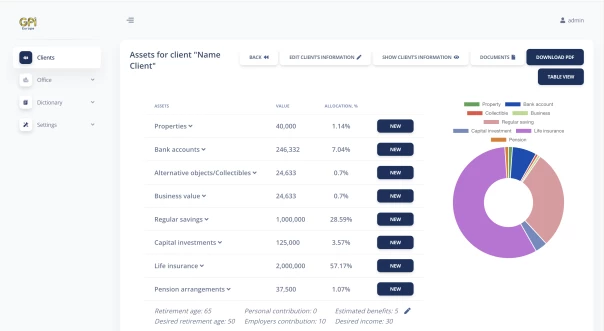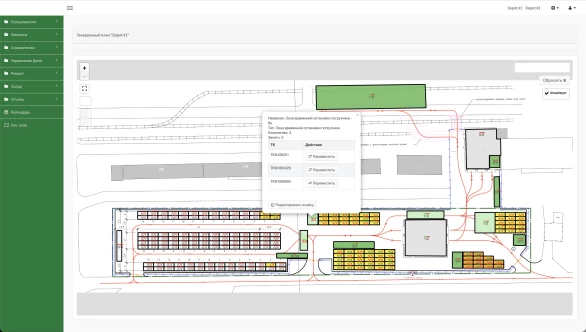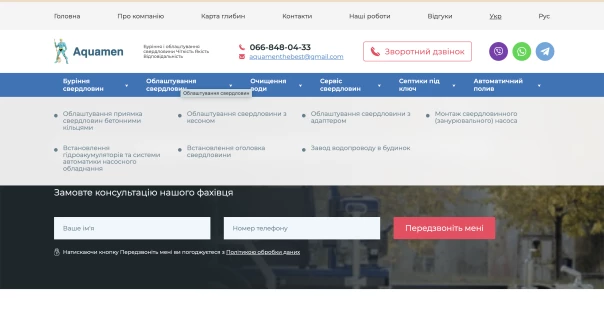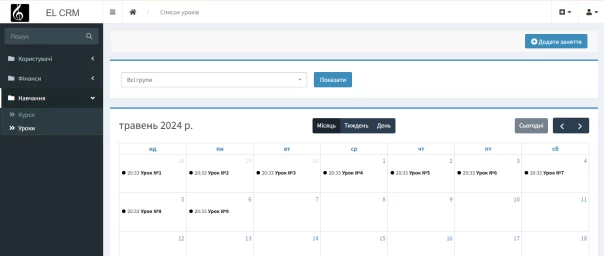ERP systems in Ukraine
The market of ERP management systems in Ukraine. List of popular software for business process automation. Individual ERP for special tasks. Where is the ERP market going in Ukraine – development trends.

CRM System Replatforming for Financial Consultants
More about the serviceCRM System Development
We provide a full range of services for the development and support of online stores, informational websites, CRM/ERP systems, and SEO optimization — from creating technical specifications and prototyping to configuration, launch, and ensuring the quality and stability of your product.

Development and Support of ERP for a Tank Washing and Repair Depot
More about the serviceERP System Development
We develop custom ERP systems — comprehensive solutions for automating and integrating key business processes (finance management, HR, production, supply chain, sales, and more). We provide a full cycle of services: needs analysis and technical specification development, architecture design, system development and integration with existing solutions, implementation with staff training, as well as technical support and regular updates.

Online stores for beauty professionals.
More about the serviceOnline Store Development
Online store development is a comprehensive process of creating an e‑commerce platform tailored to all client requirements — from preparing technical specifications, prototyping, and design to implementing the website and admin panel, testing, content integration, and ongoing support. This ensures a convenient UX for customers and seamless store operation.

Development of an SEO-optimized informational website for a well drilling company.
More about the serviceDevelopment of informational websites
The development of an informational website is essential for those who aim to showcase their activities online and attract new clients: a modern business card website allows for flexible content updates through an admin panel, displays news and links to social media, and is optimized for search engines, retaining existing audiences and increasing brand trust.

SEO website promotion — boosting visibility and attracting clients from search
We help businesses receive a stable flow of clients from Google. SEO promotion is not just about keywords, but a comprehensive set of work — from technical optimization and content to analytics and link-building.
We create business websites for companies of any size
We develop modern business websites that help present your company, attract new clients, and increase brand trust. These can be landing pages, corporate websites, or multi-page portals with additional functionality.

Content creation — texts, visuals, and videos for your business
We combine the power of artificial intelligence with the expertise of our copywriters, designers, and video editors. We create texts, visuals, and videos that help your brand look professional, communicate effectively, and attract customers.
We create convenient business card websites for companies of any scale
We develop business card websites that help quickly present services, increase recognition, and attract clients. Such websites are ideal for specialists, small companies, or brands that require a compact yet professional online presence.

Content management — professional content creation and support for your website
We take care of all tasks related to content creation, updates, and website structure. Content management is a set of services that includes adding texts, photos, products, news, SEO elements, and keeping your website up to date.

Server administration — stable performance, security, and productivity for your business
We provide full technical server administration to ensure your websites and services run reliably 24/7. Our team has been working for years with Hetzner — one of the most reliable European data centers. We know how to properly configure, optimize, and maintain the infrastructure for your project.
We create intelligent chatbots for Telegram, Viber, WhatsApp, and websites
We develop chatbots that automate customer communication, sales, and technical support. Bots help respond faster, collect requests, accept payments, and operate 24/7 without days off.

Screenshot of the warehouse management module
View Case
ERP system for managing a tank container cleaning and repair station, built on Symfony and deployed on Linux Ubuntu with MySQL for reliability and scalability. The solution includes an administrative panel and a client portal with 49 modules for managing clients, orders, finances, calendar, inventory, and reporting, with capabilities for automatic PDF invoice generation, notifications, and data export to accounting software for complete business process digitalization.

Homepage of the website, VIP announcements block
View Case
A platform for posting announcements in the agricultural sector, connecting farmers, suppliers, and buyers to streamline the buying and selling of agricultural goods and services with increased market transparency and reduced search costs. The system includes an admin panel for moderating announcements, managing content, and analytics, as well as a seller's personal account with the ability to publish and manage announcements and transaction history.

Homepage of the website, VIP announcements block
View Case
A CRM system for a financial consulting company, developed as a custom solution instead of a SaaS product to automate document management and enhance client interaction through admin and client interfaces, with capabilities to manage assets, users, calendars, and dictionaries, generate PDF reports, and synchronize events with Outlook. The project is built on Symfony with PHP 8.3, deployed on Ubuntu 22.04 with a MySQL 8.0 database to ensure system reliability, security, and scalability.

Main Menu of the Project
View Case
Informational website Aquamen for water well drilling services, built with a user‑friendly admin panel for managing users, content blocks, and a feedback module. It supports SEO features (automatic sitemap, no‑index/no‑follow) and sends notifications about new requests via a Telegram bot.

Home Page, Main Menu
View Case
Online store for beauty professionals, developed on Symfony 6.4 and PHP 8.3, deployed on an Ubuntu 22.04 server with a MySQL 8.0 database. It features an intuitive client interface with a product catalog, shopping cart, and order checkout, along with a powerful admin panel for managing products, categories, brands, users, orders, and SEO optimization. The system supports data export and automatic generation of PDF invoices and reports.

Website Home Page, Users, Finance, Learning
View Case
CRM system for a foreign language school designed to efficiently manage student relationships: it enables storing and structuring personal data, course history, and communication records, while automating registration, payment, and class scheduling processes through three key modules — Users, Finance, and Learning.

Website Home Page, Users, Finance, Learning
View Case
A custom CRM system for a service business in the truck detailing industry. The solution enables centralized management of clients, services, orders, payments, and staff, automates payroll calculations, and provides detailed business analytics.

Website Home Page, Users, Finance, Learning
View Case
A Telegram bot with an administrative panel was developed for the client, allowing for the automation of order intake, product catalog management, and request processing without operator involvement. The solution is designed for fast customer service and easy management for the business.

Website Home Page, Users, Finance, Learning
View Case
A ready-made solution for launching an expert business focused on selling services and products. The website structure is adapted for scalable growth, easy content management, and fast project launch.

Expansion of the customer base, employees, and the growth of internal processes are the consequences of normal business evolution. However, there comes a time when it is difficult to manage all areas equally well. Timely applied tools will help automate work processes. These are ERP and CRM systems.
The integration of such complexes is considered a necessary criterion for the company's further development. A business that stands still cannot compete with similar ones. The current pace of development in various areas requires owners to take serious measures, and CRM and ERP are key elements.
If previously workflows involved manual process management, today it is extremely inefficient. ERP for business, as well as CRM, are complex systems designed to transfer the routine work of employees to software. This reduces the number of potential errors and saves time per customer.
You need to understand that developing a CRM or using existing technology to optimize the processes of interaction between a company and its customer base is the main tool of the sales department. CRM for business performs several important tasks:
CRM for business is a complete database for each customer. Without it, each company would spend a lot of time on a dialog with the buyer: clarifying details, the type of product, customer details, and so on. CRM "remembers" this information, which means that the checkout process takes much less time.
Just like the previous software, ERP development speeds up the management of company processes and distributes them among staff. Its functions include:
Analytics are presented in the form of visual dashboards. Management does not need to analyze tables and graphs manually. The ERP system for business will conduct analytics on its own and provide visual results. With such software, it is convenient to ensure the work of different departments of the company as a whole.
ERP for business gives a complete picture of the company's capabilities. For example, when ordering, the complex will automatically analyze the availability of goods in the warehouse, the current cost, and create a preliminary package of documents for shipment. This used to be done by employees. ERP will complete the task offline, in the shortest possible time.
The main advantage of ERP and CRM in terms of working with data is its chronological nature. The systems automatically structure the data so that employees can see it from the moment of the first contact with the client to the current status.
You can order the development of these systems from Skylex. Our web studio is focused on these products and has experience in developing them for various customer requests.
A CRM system for business ensures effective work with each customer. The employee immediately sees the entire history of the client: purchases, transactions, orders, and requests to the technical service. CRM for business combines all communication channels (phone, website, social networks) in one place, creating a single information structure.
Integration of ERP into business will allow you to structure all company data, from the availability of goods in the warehouse to documentation. This provides a single information system for all departments of the company with the ability to make operational decisions quickly. The speed in business means a lot.
We've already explained the differences between ERP and CRM, but let's identify two key criteria:
CRM is needed when a business is focused on sales;
ERP is more extensive, the system is suitable if you need to establish processes in all departments, not just sales.
To put it simply, ERP for business is justified when the company's priority is given to production and warehouse processes. However, these products should not be unequivocally separated. There are large software packages that combine ERP and CRM for business in one package. Such solutions are suitable for large companies with a complex management structure.

The market of ERP management systems in Ukraine. List of popular software for business process automation. Individual ERP for special tasks. Where is the ERP market going in Ukraine – development trends.

This article will help you understand what ERP is for, what are the benefits of the system, and what businesses need it. The information in this article will help you decide whether off-the-shelf ERP solutions are right for you or whether you should develop your own management product.

Сommodity business – is one of the most complex spheres of business. This business requires maximum management attention to every element within the company. The way to help yourself in this task is to integrate CRM into workflows.
Fill out the form to receive a free consultation
